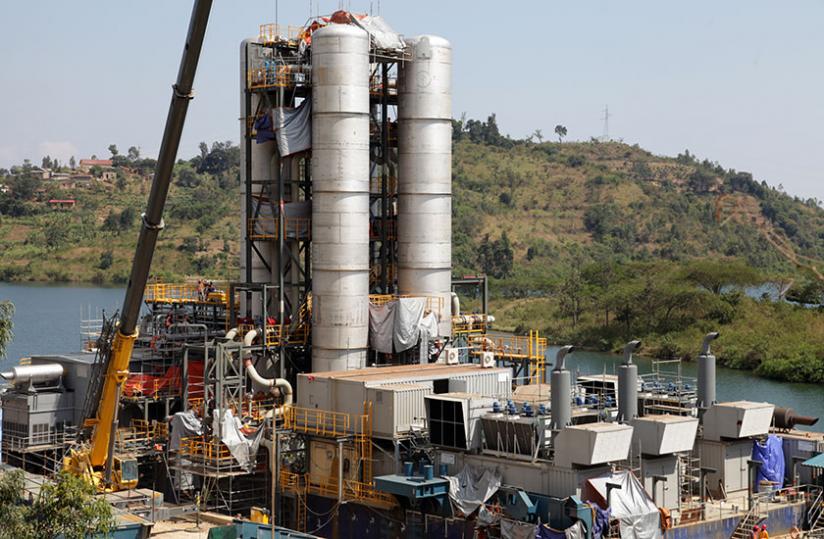A top government official has given the strongest reassurance yet that Contour Global will finally generate the long-awaited 25MW of energy from its Kivuwatt project on Lake Kivu come February 2015.


A top government official has given the strongest reassurance yet that Contour Global will finally generate the long-awaited 25MW of energy from its Kivuwatt project on Lake Kivu come February 2015.
Germaine Kamayirese, the state minister for Energy, Water and Sanitation, was yesterday speaking to members of the senatorial standing committee on Economic Development and Finance.
She was appearing before the committee to explain the progress made on various energy projects, several of which have missed initial deadlines –with several senators sharing their doubts on the American firm’s commitment to the new deadline as well as the country’s chances of meeting national energy targets.
Located in Karongi District, Western Province, Kivuwatt project is expected to produce a total of 100MW from the Methane Gas in Lake Kivu upon completion, but has failed to meet previous deadlines to add the initial 25MW to the national grid from its ongoing pilot phase.
Currently the country produces 145MW and additional capacity from Kivuwatt would be a welcome boost, with senators expressing concerns that energy projects were not delivering results fast enough.
"We haven’t yet given up on Kivuwatt. We still believe they will produce 100MW,” minister Kamayirese told the legislators, adding that technocrats behind the project had assured government that the plant will deliver the initial package by February.
A whopping $142 million (about Rwf92 billion) is expected to be spent on phase I (pilot) of the Kivuwatt project. It is planned that three more phases will be undertaken later on.
Yet it’s been three years of delays since the project first promised to deliver on generating 25MW under the project’s phase I operations, several years after the government signed an energy generation agreement with Contour Global –in 2009.
The country is in an urgent need to significantly scale up its power capacity and bureaucrats and technocrats alike are working round the clock to deliver the national capacity target of 563MW by 2017 as envisaged in the ambitious EDPRS II growth blueprint.
Both local and foreign investors have generally hailed Rwanda’s business environment but some have expressed concerns over the country’s ability to supply adequate and uninterrupted power in the not so distant future.
Senator Perrine Mukankusi, the chair, Standing Committee on Economic Development and Finance, is among those with little faith in Contour Global with regard to Kivuwatt.
"There are still qualms about this happening because the project owners have always given us timeframes that were never met. But let’s hope that they will meet the new timeframe as promised,” she told The New Times.
Senator Michel Rugema demanded reassurance from Energy officials. "What we need to see is 25MW produced and added to the national grid. We need to know when this will happen,” he told the government officials during the session at Parliament.
Robert Nyamvumba, the Managing Director, Energy Development Company Ltd, sought to quash lingering doubts insisting that that there was realistic hope that Contour Global will this time round meet its deadline because it had completed nearly 90 per cent of the work needed to start commissioning electricity.
"What has been accomplished is promising,” he told members of the committee.
Government is also pursuing several other projects including in alternative sources such as peat, wind and solar energy, while efforts are also underway to import substantial capacity from other countries in the region, notably Ethiopia and Kenya.
Officials have in the recent past been buoyed by progress in talks to import up to 400MW from Ethiopia and another 30MW from Kenya, deals which are being negotiated under the broader Northern Corridor Integration Projects agenda, which involves Kenya, Rwanda, Uganda and, to some extent, South Sudan and Ethiopia.
"We have signed the contracts and are currently upgrading our substations and power lines to accommodate the extra 30MW from Kenya and the 400MW we expect to get from Ethiopia,” Jean Bosco Mugiraneza, the chief executive of Rwanda Energy Group, said recently.
Energy imports from Kenya could be realised as early as 2015, officials said.
And, in yesterday’s session at the Senate, Minister Kamayirese sounded optimistic that the country’s energy targets were within reach. "Our target is still 563MW. It is ambitious but we have many energy projects in the pipeline which will mature in the next two years.”
She was responding to Senator Mukankusi’s question whether the government still considered the 563MW target by 2017 realistic given the current pace of energy production in the country, which she described as slow.
"What assurance is there that the target will be met; is it may be time to revise the targets to make them realistic?” Mukankusi had asked the minister.


